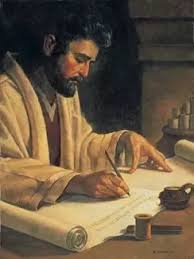The Purpose of Luke’s Gospel
Luke 1: 1-4
The Purpose of Luke’s Gospel DIG: What do you learn from these verses about Luke? What do you learn about why he wrote this gospel? What do you learn about where he got his sources?
REFLECT: How much assurance do you have? Do you know that you are saved through faith in Jesus Christ? Do you know that the Bible is the Word of God? If you really knew the Word of God, would you believe it?

Luke was a Hellenistic Jew. He displays detailed understanding of the Hebrew Scriptures, as well as expressing an understanding of the God-fearers (Gentiles who attended synagogues and lived lives informed by Judaism, but did not convert). Moreover, he addresses both his Gospel and Acts to a Hebrew high priest, Theophilos, who held that office between 37 and 41 AD. He begins his gospel with a formal prologue similar in style to other writers of the first century, most notably Josephus in his book Contra Apionem, a work written in two parts with a preface to the whole work at the beginning of the first book and a brief review at the beginning of his second book.14 He is the only one of the four gospel writers that stated his purpose at the beginning of his book. Being familiar with other writings about the life of Christ and the message of the Good News, these verses contain some of the finest literary Greek in the first century. Dear Theophilos: Many have undertaken to draw up an account of the things that have been fulfilled among us, just as they were handed down to us by those who from the first were eyewitnesses and servants of the word. Obviously, an educated and skilled writer, Luke stressed the historical reliability of his book, claiming to have received information from eyewitnesses.15
It is almost certain that in the process of writing his gospel, Luke sought details about Jesus’ birth and life from Mary. Since Luke included several details that only Mary could have known, we can be fairly sure that Miryam herself was one of Luke’s primary sources. Luke’s inclusion of several facts from Yeshua’s early life (Luke 2:19, 48, 51), suggests that this was the case. Mary’s own eyewitness testimony must also have been Luke’s source for the account of Simeon’s prophecy (Luke 2:29-32), for who but she could have known and recalled that incident? Apparently, the old man’s prophecy never left her mind.16
Two words are important in this passage that we should not overlook. The first is the word eyewitness. It comes from the Greek word autoptai – auto meaning that which is of itself, and opsomai meaning to see. To see for yourself, would be an eyewitness. It is a medical term that means to make an autopsy. So, it is as if Doctor Luke is saying, “We are eyewitnesses who made an autopsy, and I am writing to you about what we found.” The second important word is servants, which is the Greek word huperati, meaning an under-rower on a boat. In a hospital the under-rower is an intern. What Luke is saying is that all of them were just interns under the Great Physician. As a physician and a scholar, Luke said that he made an autopsy of the records of those who had been eyewitnesses.17
Ancient writers customarily gave some statement concerning their qualifications for writing. So here Luke states his credentials. He said: With this in mind, I myself have carefully investigated everything from the beginning. Luke carefully investigated all accounts to ensure their truthfulness, and produced an orderly account of the Messiah’s earthly ministry. We do not know all the resources Luke had at his command. It is clear, however, that aside from the Holy Spirit, the inspired gospel of Mark was his main source. He does not criticize his predecessors, but, wanted to write Luke and Acts to provide sound biblical teaching on the part of those who had already been taught, but perhaps imperfectly or incompletely, in the life of Christ. Luke wanted his audience to be able to sift out what was reliable from what was uncertain.
It seemed good also to me and to the Rauch Ha’Kodesh (Acts 15:28), to write an orderly historical account for you. The Greek word for an orderly account means a chronological account; therefore, Luke is the only gospel writer that claims to write his book in a chronological manner.
The purpose of Luke’s gospel is to confirm for Theophilus, whose name means lover of God, the truth of the Good News, and to reassure him of the things he had learned. Luke shows him that all along, ADONAI had a plan to include Gentiles. This was a polite form of address used for lofty persons, and found only here in the gospels, and in Acts 23:26, 24:3 and 26:25.18 Luke wanted Theophilus to know that the faith that he had embraced had a secure historical foundation. So that you may know the certainty, the exact truth, of the things you have been taught. It is the same for us today. Doctor Luke wrote his gospel to guarantee us of the certainty and assurance about Christ. Although the gospel of Luke was originally written to an individual (or at least dedicated to him), in time it was circulated to others as a presentation of Yeshua and His ministry.



Leave A Comment